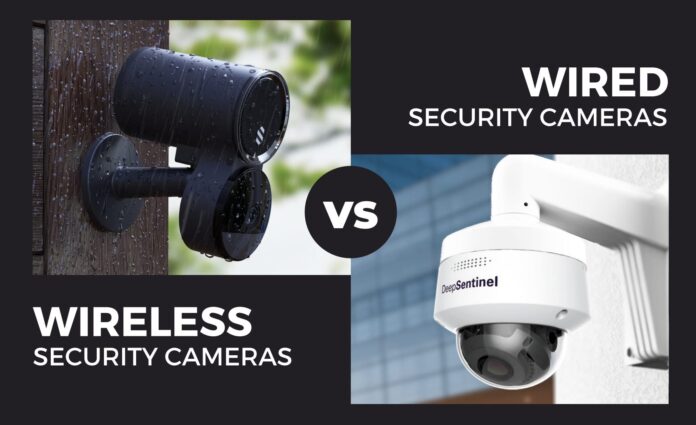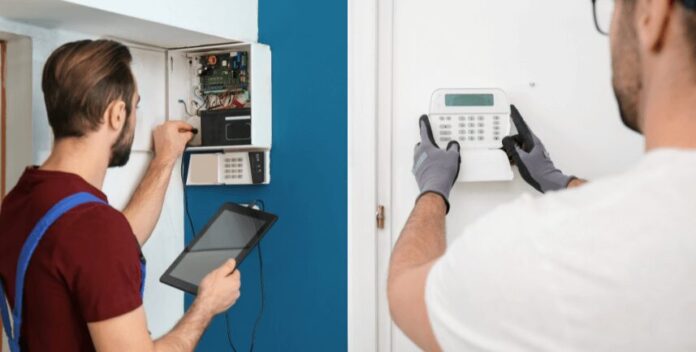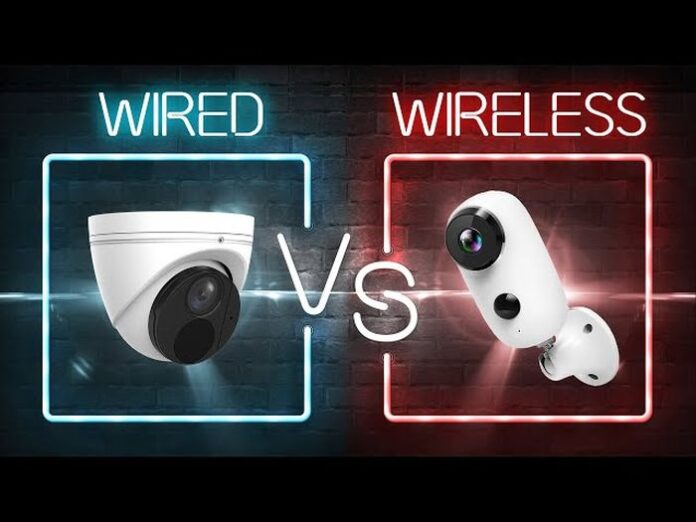Home security systems play a crucial role in protecting our homes and loved ones.
But choosing different systems we have available on the market can be a problem if you are not educated in the subject.
That is why we would like to provide you with key differences between wired and wireless security systems.
With this in mind, making the decision will be much easier.
What Are Wired and Wireless Security?


Wired security systems rely on physical connections for power and communication, using the home’s electrical wiring and telephone lines. They connect sensors and cameras through coaxial or Ethernet cables to a central control panel.
Wireless security systems, on the other hand, use radio frequency, Wi-Fi, or cellular signals for communication. These are powered by batteries or power outlets and are typically controlled through mobile apps or cloud-based platforms.
Understanding the basic functioning of each type is essential to appreciate their unique advantages and limitations. While wired home security system offers stability and robust coverage, wireless systems provide flexibility and ease of installation.
How They Work
Now let’s talk about how these work.
Wired
Wired security systems are connected through the home’s electrical wiring and telephone lines.
Sensors and cameras communicate with the central control panel via coaxial or Ethernet cables. This setup ensures stable and reliable communication with minimal interference.
The central control panel acts as the brain of the system, processing signals from the sensors and cameras.
Due to the nature of wired connections, these systems can cover large areas efficiently, making them suitable for expansive properties.
Wired systems often come with backup battery options, ensuring continuous operation even during power outages.
However, the installation process is invasive, requiring professional expertise to manage the extensive cabling and integration into the home’s infrastructure.
Wireless


Wireless security systems operate using Wi-Fi, cellular signals, or radio frequency for communication. The sensors and devices are typically battery-powered, although some may use power outlets.
Control and monitoring are done through mobile apps or cloud-based platforms, offering remote access from anywhere. This makes wireless systems highly flexible and convenient, allowing users to easily integrate them with other smart home devices.
Installation is straightforward, and often DIY-friendly, eliminating the need for professional installation.
However, these can be susceptible to interference from other wireless devices, and maintaining battery power for sensors is an ongoing requirement.
The range is also limited by the strength and reach of the Wi-Fi or cellular signals.
Pros and Cons of Wired Security
Now let us address the pros and cons of wired security systems.
Pros
Wired security systems are known for their reliability due to stable and interference-free signals. The continuous power supply, backed by battery options, ensures uninterrupted operation.
These systems are more secure against hacking compared to their wireless counterparts. They offer extensive coverage, making them ideal for larger homes with multiple zones.
The hardwired connections between sensors, cameras, and the control panel enhance the overall reliability.
Cons
The primary drawback of wired security systems is the invasive installation process, which often requires professional assistance. This can be a significant deterrent for renters or those who frequently move.
The visibility of wires can be aesthetically unappealing and may require maintenance over time.
Wired variants can be vulnerable to phone line disruptions, impacting their overall reliability.
Pros and Cons of Wireless Security
Wireless systems come with their own string of pros and cons as well.
Pros
Wireless security offers the advantage of easy installation, often suitable for DIY setups. Their portability makes them ideal for renters or those who relocate frequently.
The flexibility of these allows for seamless integration with other smart home devices, enhancing overall home automation. Remote access through mobile apps provides convenience and real-time monitoring from anywhere.
Cons
Wireless systems are susceptible to interference from other electronic devices, which can impact their reliability. Regular battery maintenance is required to ensure continuous operation of sensors and devices.
Wireless security can be compromised due to potential hacking risks and their dependency on Wi-Fi or cellular networks. The signal range can also limit the effectiveness of the system, particularly in larger homes with multiple floors or thick walls.
Key Differences
The installation process significantly differentiates wired and wireless security. Wired variants require professional, invasive installation involving extensive cabling, while wireless systems are typically DIY-friendly and non-invasive.
Wired systems rely on the home’s electrical wiring for power, whereas wireless use batteries or power outlets. Communication in wired occurs through telephone lines or Ethernet cables, providing stable signals.
In contrast, wireless systems utilize Wi-Fi or cellular signals, which can be prone to interference.
Portability is another key difference; wired systems are fixed and challenging to move, making them less suitable for renters.
Wireless systems, being portable, are ideal for those who move frequently or rent their homes.
Choosing the Right One for Your Needs
Selecting the right security system depends on various factors. Homeowners may prefer wired systems for their reliability and extensive coverage, especially in larger homes.
Renters or those with frequent relocation needs might find wireless more suitable due to their portability and ease of installation.
Budget considerations also play a crucial role, as wired ones can be more expensive to install and maintain. Technology preferences, such as integration with smart home devices, might sway users towards wireless systems.
Security needs are paramount; those requiring robust, interference-free security might lean towards wired systems, while others may prioritize the flexibility and remote access capabilities of wireless systems.
Hybrid Variants
Hybrid systems combine elements of both wired and wireless security systems, offering a balanced approach to home security. These can integrate wired components like cameras and sensors with wireless control panels and remote access features.
Hybrid systems are particularly beneficial in large homes where certain areas may be better served by wired connections, while other sections, like guest houses or garages, might benefit from wireless setups.
The Bottom Line


Both wired and wireless security systems have unique advantages and drawbacks. Evaluating your personal needs and circumstances is crucial in making the right choice. Consider seeking professional advice to ensure the best fit for your home security requirements.







